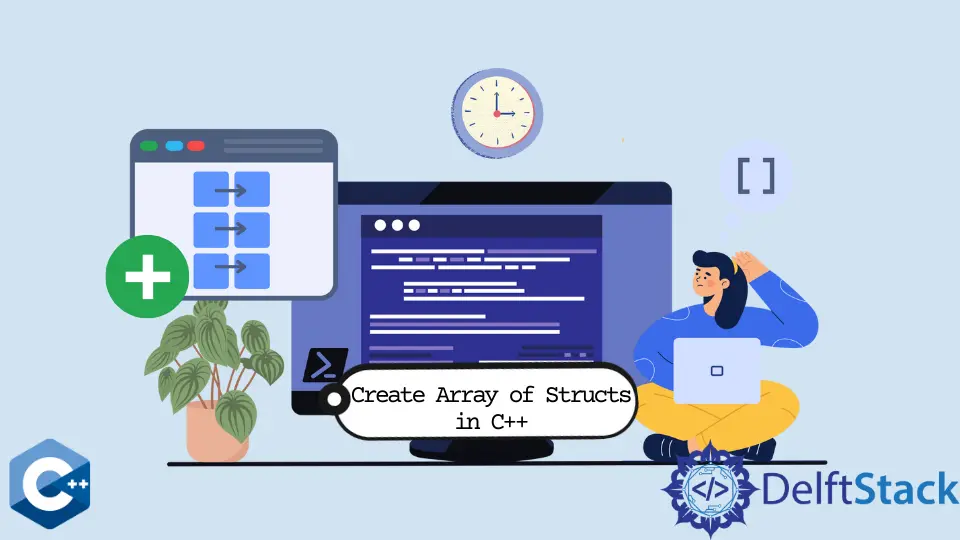C++에서 구조체 배열 만들기

이 기사에서는 C++에서 구조체 배열을 만드는 방법에 대한 여러 방법을 보여줍니다.
C 스타일 배열 선언을 사용하여 구조체의 고정 길이 배열 만들기
구조체의 고정 길이 배열은[]C 스타일 배열 표기법을 사용하여 선언 할 수 있습니다. 이 경우 여러 데이터 멤버와 2 개의 요소 배열을 초기화 한Company라는 임의의struct를 정의했습니다. 이 메서드의 유일한 단점은 선언 된 배열이 내장 함수가없는 원시 객체라는 것입니다. 장점은 C++ 라이브러리 컨테이너보다 더 효율적이고 빠른 데이터 구조입니다.
#include <iostream>
#include <string>
#include <vector>
using std::cout;
using std::endl;
using std::string;
using std::vector;
struct Company {
string name;
string ceo;
float income;
int employess;
};
int main() {
Company comp_arr[2] = {{"Intel", "Bob Swan", 91213.11, 110823},
{"Apple", "Tim Cook", 131231.11, 137031}};
for (const auto &arr : comp_arr) {
cout << "Name: " << arr.name << endl
<< "CEO: " << arr.ceo << endl
<< "Income: " << arr.income << endl
<< "Employees: " << arr.employess << endl
<< endl;
}
return EXIT_SUCCESS;
}
출력:
Name: Intel
CEO: Bob Swan
Income: 91213.1
Employees: 110823
Name: Apple
CEO: Tim Cook
Income: 131231
Employees: 137031
std::vector 및 이니셜 라이저 목록 생성자를 사용하여 구조체의 가변 길이 배열 만들기
또는std::vector 컨테이너를 사용하여 데이터 조작을위한 여러 내장 메서드를 제공하는 변수 배열을 선언 할 수 있습니다. std::vector 객체는 이전 예제와 동일한 표기법으로 초기화 할 수 있습니다. 기존의 push_back메소드를 사용하여 새 요소를 배열에 추가하고 마지막 요소는 pop_back으로 제거 할 수 있습니다. 이 예에서 요소는 콘솔에 하나씩 인쇄됩니다.
이니셜 라이저 목록 멤버는 올바른 할당 및 형식 지정을 위해 외부 중괄호를 포함해야합니다.
#include <iostream>
#include <string>
#include <vector>
using std::cout;
using std::endl;
using std::string;
using std::vector;
struct Company {
string name;
string ceo;
float income;
int employess;
};
int main() {
vector<Company> comp_arr = {{"Intel", "Bob Swan", 91213.11, 110823},
{"Apple", "Tim Cook", 131231.11, 137031}};
for (const auto &arr : comp_arr) {
cout << "Name: " << arr.name << endl
<< "CEO: " << arr.ceo << endl
<< "Income: " << arr.income << endl
<< "Employees: " << arr.employess << endl
<< endl;
}
return EXIT_SUCCESS;
}
출력:
Name: Intel
CEO: Bob Swan
Income: 91213.1
Employees: 110823
Name: Apple
CEO: Tim Cook
Income: 131231
Employees: 137031
Founder of DelftStack.com. Jinku has worked in the robotics and automotive industries for over 8 years. He sharpened his coding skills when he needed to do the automatic testing, data collection from remote servers and report creation from the endurance test. He is from an electrical/electronics engineering background but has expanded his interest to embedded electronics, embedded programming and front-/back-end programming.
LinkedIn Facebook